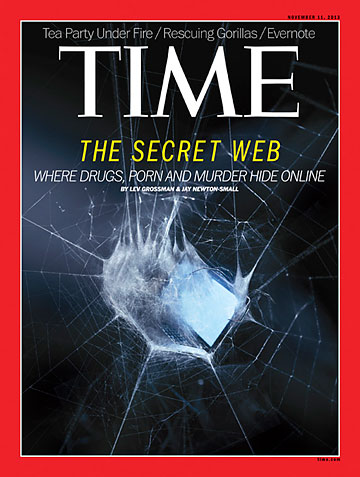
(2 of 8)
Most people who use the Deep Web aren't criminals. But some prosecutors and government agencies think that Silk Road was just the thin edge of the wedge and that the Deep Web is a potential nightmare, an electronic haven for thieves, child pornographers, human traffickers, forgers, assassins and peddlers of state secrets and loose nukes. The FBI, the DEA, the ATF and the NSA, to name a few, are spending tens of millions of dollars trying to figure out how to crack it. Which is ironic, since it's the U.S. military that built the Deep Web in the first place.
TOR DE FORCE
The story of the Deep Web is a fable of technology and its unintended consequences. In May 1996, three scientists with the U.S. Naval Research Laboratory presented a paper titled "Hiding Routing Information" at a workshop in Cambridge, England. It laid out the technical features of a system whereby users could access the Internet without divulging their identities to any Web servers or routers they might interact with along the way. They called their idea "onion routing" because of the layers of encryption that surround and obscure the data being passed back and forth. By October 2003, the idea was ready to be released onto the Net as an open-source project called Tor (which originally stood for The Onion Router, though the acronym has since been abandoned). If the Deep Web is a masked ball, Tor provides the costumes. It was a highly elegant and effective creation, so much so that even the people who built it didn't know how to break it.
In many ways Tor was less a step forward than a return to an earlier era. For much of the Internet's history, a user's online persona was linked only loosely, if at all, to his or her real-world identity. The Internet was a place where people could create new, more fluid selves, beginning with a handle or pseudonym. Through much of the 1990s, the Web promised people a second life. But over time--and in particular with the arrival of Facebook--our lives online have been tightly tethered to our off-line selves, including our real names. Now everywhere we go, we radiate information about ourselves--our browsing history, our purchases, our taste in videos, our social connections, often even our physical location. Everywhere but the Deep Web.
Why would the U.S. government fund the creation of such a system? Lots of reasons. The police could use it to solicit anonymous tips online, set up sting operations and explore illegal websites without tipping off their owners. Military and intelligence agencies could use it for covert communications. The State Department could train foreign dissidents to use it. Tor is currently administered by a nonprofit organization based in Cambridge, Mass., and sponsored by a diverse array of organizations including Google and the Knight Foundation. But as recently as 2011, 60% of its funding still came from the U.S. government.
